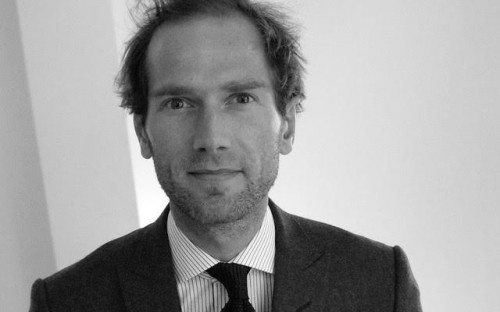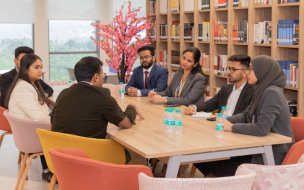After completing EMBA in 2014, he quit his full-time job and started the Robert Kerr luxury fashion brand. Thomas found Hult’s focus on practical, experiential learning to be the driving force behind his new business.
“The concrete way of teaching and learning at Hult – the business cases and working in groups with different people from different countries and cultures – it was an amazing way to challenge myself and put me out of my comfort zone,” he says.
“Every time I came to London for the EMBA, I was able to challenge my business plan and ask classmates from all around the world for advice. Without the help and diverse professional feedback from my classmates it would have been difficult for me to be so successful in launching my fashion brand.”
Hult’s part-time Executive MBA and full-time MBA and master’s programs mark a shift away from the traditional case study method, as students apply the theories they learn constantly throughout their time at the school.
In computer-based simulations, students test ideas and experience the consequences of their actions in a virtual business environment. Through the Hult Business Challenge, students engage in real-life consulting projects for real firms.
Group work is at the heart of Hult’s approach. And Hult’s diverse student body means that when MBA students work in groups, they hone their soft skills – like leadership, communication, and condlict resolution – and mimic what it’s like to work in groups in a real-life global business environment.
When they graduate, they’re ready to face the challenges of international business. In 2015, Hult graduates accepted job offers at 800 companies in 60 countries worldwide.
During his Executive MBA, Thomas worked on a three-month action project for Coca-Cola to increase the visibility of the brand for teenagers in Poland. His team had regular meetings with Coca-Cola representatives and submitted a proposal to the company for a new digital marketing strategy, some of which was implemented.
“We were put in a group chosen by the professor,” Thomas explains. “So, we had to work with people all over the world - via Skype, email and telephone – that we didn’t really know. It helped me to understand the way different people approach the same problems.
“I didn’t have a lot of skills in digital marketing,” he continues. “Working on the Hult Business Challenge helped me better understand online business.
“When you launch a luxury brand with scarves priced at over $500, it’s difficult to start selling these expensive items online. I’ve used everything I learnt during the action project to make it happen!”
Arpit Choudhary (pictured above) completed his one-year full-time MBA at Hult’s San Francisco campus in 2016. Originally from India, he came to the US with the intention of working for a technology company after graduation.
He now works in the sales development team at PulsePoint – a next-gen advertising technology platform – in Silicon Valley.
Why did he choose Hult for his MBA? “I noticed that traditional business school graduates were not able to think out of the box, innovate, and disrupt industry,” he says.
“Hult’s action projects and simulations allowed us to apply business theory to realistic scenarios of the business world, and put classroom learning into action before entering the workplace.
“Now, all the group work I did at Hult is helping me develop and execute strategies in a dynamic team environment at PulsePoint.”
During his MBA, Arpit took part in the Hult Business Challenge, engaging in a consulting project with for Johnson & Johnson, and tested out his management skills through a computer simulation based on operations at leading restaurant chain Benihana.
“I discovered new skills and interests I didn’t even know existed,” Arpit continues. “I made great friends from different cultures and backgrounds.
“And connections from Hult’s alumni network - over 17,000 graduates spread across more than 150 countries worldwide - helped me land my current job.”
For Thomas too, the practical benefits of Hult’s international alumni network have helped him take his business to the next level. He even created a special collection of hand-crafted Robert Kerr ties and scarves exclusively for Hult alumni.
“I’ve already launched my brand in different countries because of the help I’ve had from Hult alumni and colleagues in my EMBA cohort,” he says.
“Within only two years, I was able to connect internationally with talented people in different industries – banking, consulting, and retail – who I could pick up information from to help me launch my business.”
RECAPTHA :
bd
c7
61
e4









